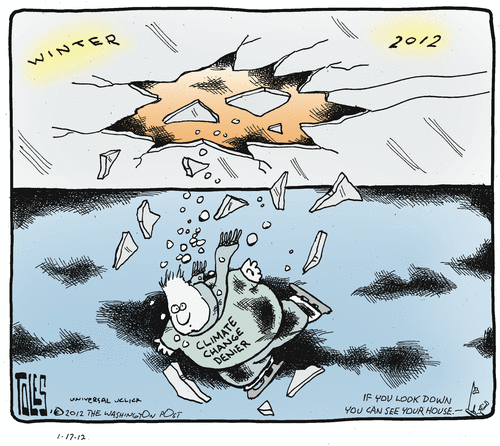2012 SkS Weekly Digest #3
Posted on 23 January 2012 by John Hartz
SkS Highlights
John Mason's Arctic methane outgassing on the E Siberian Shelf part 2 - an interview with Dr Natalia Shakhova provides the insights of one of the world's leading experts on what's happening. Dana's A Comprehensive Review of the Causes of Global Warming is another SkS original article to be reposted on many climate science friendly websites. In How do Climate Models Work?, Kate nicely explains the basic workings of climate models in a manner that can be understood by the average person as well as by climate science geeks.
Toon of the Week

H/T to Joe Romm's Climate Progress website.
Issue of the Week
In the About section of the SkS website, John Cook has stated:
“The goal of Skeptical Science is to explain what peer reviewed science has to say about global warming. When you peruse the many arguments of global warming skeptics, a pattern emerges. Skeptic arguments tend to focus on narrow pieces of the puzzle while neglecting the broader picture. …This website presents the broader picture by explaining the peer reviewed scientific literature.”
From your perspective, how well does SkS communicate what peer reviewed science has to say about global warming? Does one have to be a climate science wonk in order to comprehend the majority of articles posted on SkS? Does the three-tiered rebuttal system serve a useful purpose? How could SkS better communicate information to the average person who has only a rudimentary understanding of climate science?
The Week in Review
A complete listing of the articles posted on SkS during the past week.
Coming Soon
A list of articles that are in the SkS pipeline. Most of these articles, but not necessarily all, will be posted during the week.
- Patrick Michaels Continues to Distort Hansen 1988, Part 1 (Dana)
- New research from last week 3/2012 (Ari Jokimäki)
- Patrick Michaels Continues to Distort Hansen 1988, Part 2 (Dana)
- The Year After McLean - A Review of 2011 Global Temperatures (Dana)
- Greenhouse Effect Basics: Warm Earth, Cold Atmosphere (Tom Curtis)
- Glaciers have retreated worldwide (Mark R)
- RW Wood and the Greenhouse Effect (Eli Rabbett)
SkS in the News
??Patrick Michaels: Serial Deleter of Inconvenient Data was re-posted and linked on a number of sites - Climate Progress, Climate Crocks, PlanetSave, Deltoid, Rabbett Run, The Climax, and the Energy Education Foundation, among others.
John Mason's Arctic methane outgassing on the E Siberian Shelf was re-posted on Climate Progress.
A Comprehensive Review of the Causes of Global Warming was re-posted on Climate Progress, TreeHugger, and PlanetSave.
SkS Spotlights
The Global Carbon Project was formed to assist the international science community to establish a common, mutually agreed knowledge base supporting policy debate and action to slow the rate of increase of greenhouse gases in the atmosphere.
The growing realization that anthropogenic climate change is a reality has focused the attention of the scientific community, policymakers and the general public on the rising concentration of greenhouse gases, especially carbon dioxide (CO2) in the atmosphere, and on the carbon cycle in general. Initial attempts, through the United Nations Framework Convention on Climate Change and its Kyoto Protocol, are underway to slow the rate of increase of greenhouse gases in the atmosphere. These societal actions require a scientific understanding of the carbon cycle, and are placing increasing demands on the international science community to establish a common, mutually agreed knowledge base to support policy debate and action.
The Global Carbon Project is responding to this challenge through a shared partnership between the International Geosphere-Biosphere Programme (IGBP), the International Human Dimensions Programme on Global Environmental Change (IHDP), the World Climate Research Programme (WCRP) and Diversitas. This partnership constitutes the Earth Systems Science Partnership (ESSP).































 Arguments
Arguments























 0
0  0
0






Comments